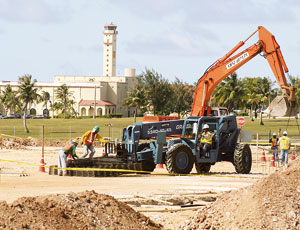A move by a Hawaii Democratic congressman to insert labor provisions into the House version of the 2010 military spending bill that would affect Guam's multibillion-dollar troop redeployment facility expansion program is raising concern among U.S. officials and potential contractors about big cost impacts.

The bill, enacted late last month, includes language added by Rep. Neil Abercrombie, a member of the House Armed Services Committee. It would require contractors involved in the estimated $15-billion Guam military facility expansion to pay construction workers prevailing wages equivalent to those paid in Hawaii, and to limit to 30% the proportion of allowed workers on the project who are not from Guam or from the U.S. mainland.
Guam Gov. Felix Camacho has said that Filipino workers would be among workers favored to be hired to fill many of the estimated 10,000 to 15,000 jobs to stem from the island's infrastructure buildup that will make possible the transfer of 17,000 U.S. Marines, dependents and other military personnel from the Japanese island of Okinawa. The redeployment stems from a 2006 treaty between the US and Japan. According to published reports in Guam, Camacho says that Filipino workers are favored to bolster the Guam indigenous workforce because of English-speaking capability, skills level and experience in working overseas. Construction workers would be required to return home after their projects are completed, a provision that is set to be included in their contracts.
“At a time when a depressed economy has dealt a body blow to our construction industry, the Defense Dept. should not even consider turning over badly needed jobs to foreign workers at questionable wages,” said Abercrombie. “My amendments provide clear guidelines to manage the buildup while ensuring quality work.” His provisions also require reports on efforts to recruit U.S. construction workers to be filed to Congress by next June.
The Pacific island’s construction program was generated by a 2006 treaty between the U.S. and Japan to transfer at least 17,000 U.S. Marines and dependents, as well as other military personnel from the Japanese island of Okinawa to Guam, a U.S. territory.
But the U.S. Congressional Budget Office claims the provisions could add another $10 billion in project costs between 2010 and 2014. While Japan is funding some of the military relocation costs, CBO says it “does not expect the Japanese government to increase its share.” Guam's congressional representative, Madeleine Z. Bordallo, says Abercrombie's amendment could add $2 billion in the next fiscal year alone. "I believe a compromise is necessary that would increase wages for workers on Guam as well as provide incentives for contractors to recruit American workers," she says.

ABERCROMBIE
The Senate has yet to pass its defense spending bill, but a spokesman for Abercrombie says that chamber’s armed services committee has approved the Guam provisions. He also disputes some CBO cost impact calculations. No date is yet set for Senate action but the spokesman anticipates that before Congress' August recess.
However, other Capitol Hill sources say final full Senate approval of the provision is not guaranteed, contending that the chamber may not follow the House's action. As such, the Guam Contractors Association and other employer groups on the island are ratcheting up lobbying against the provisions, claiming they will have “ripple effects” on the local economy.
U.S. firms working in Guam also are watching how the provisions progress. “We support a prevailing wage but translating Hawaii to Guam would be tough,” says Richard Fox, CEO of CDM Inc., Cambridge, Mass., which recently completed a $36-million base exchange for the U.S. Air Force on the island and is managing a $45-million design-build wastewater treatment plant upgrade for the U.S. Navy.





Post a comment to this article
Report Abusive Comment